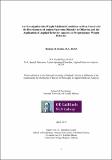| dc.description.abstract | Obesity (OB) has been identified as one of the greatest health concerns of the present time, due to the universally increasing rates (WHO, 2016). It has been found that a large proportion of the rise of OB is among women of child-bearing age (Berghöfer et al., 2008). Excessive weight pre-pregnancy has been shown to contribute to a significant number of maternal and offspring complications (American College of Obstetricians and Gynecologists, 2013). Among those recently studied complications is offspring risk of Autism Spectrum Disorder (ASD) where OB and co-morbid conditions were present in pregnancy. OB and its related effects on pregnancy have been identified as requiring additional research and a central opportunity to limit controllable risk factors for the development of ASD in offspring (Xu et al., 2014). However, a barrier to investigating these outcomes is the lack of effective interventions to manage OB (O’Neill et al., 2012). In parallel with the increase in ASD rates, OB presents a significant health concern for both mother and child and is in need of further investigation regarding both the effects of the conditions and in the development of efficacious interventions (Nevison, 2014). This thesis aimed to evaluate maternal weight mediated conditions as risk factors for the development of ASD in offspring, to review the current approaches to weight management among women of child-bearing age, and to evaluate a functional assessment and function-matched intervention for the management of weight pre-pregnancy.
The study of environmental risk factors is an important and emerging area in understanding the etiology of ASD. Maternal weight related health factors which impact offspring risk of ASD is a novel, yet important area of investigation. Chapter 1 was a review into maternal conditions surrounding pregnancy which impact offspring ASD risk. Chapter 1 identified weight mediated conditions as emerging risk factors for childhood ASD diagnosis, and highlights the need for additional and varied research in the area.
Chapter 2 evaluated diabetes mellitus (DM) and OB in pregnancy as risks for the development of ASD in offspring. The results from Chapter 2 support previous findings in literature which suggest that there is a significantly increased risk of a child being diagnosed with an ASD, when DM and OW/OB are present in pregnancy. Furthermore, Chapters 2 found that children were at a risk for additional diagnosis requiring special education services where OW and OB were present.
Chapter 3 evaluated the current standards of weight management programs from a behavior analytic perspective, to identify gaps where applied behavior analysis (ABA) can impact the treatment of weight related behavior patterns. Findings show a lack of assessment with regard to function of behavior in the current literature. Chapter 3 discussed that due to the absence of functional assessment, there is a persistent gap in the ability to identify and decrease variables which maintain problematic eating behavior.
Chapter 4 modified components of previously established measures to create an assessment package for the identification and functional assessment of eating behaviors in women of child-bearing age, outside of clinical eating disorders and binge eating. FBA results highlight the individual nature of eating behavior across participants and the need for individualized, function matched intervention to focus on behaviors related to weight.
A single-subject, individualized and function matched intervention was then implemented in Chapter 5 with the aim of decreasing problematic eating behaviors and increasing health of women pre-pregnancy. Results suggested that the information collected within the FBA lead to a matched intervention which was successful in removing maintaining variables, decreasing the engagement in target behaviors and increasing the engagement in alternative and functionally equivalent behaviors for each participant’s unique needs.
This thesis found that pre-pregnancy OB among women of child bearing age is a significant risk factor for ASD and other disabilities in the offspring of those pregnancies. The current options for weight supports to decrease BMI before becoming pregnant are significantly lacking, while OB grows globally. ABA provides an evidence-based direction for the assessment and matched treatment of weight related behavior patterns which can aid in decreasing this global health epidemic. Research needs to focus on the mitigation of controllable risks for ASD and other condition. This thesis opens the discussion to ABA as a key factor in decreasing these controllable risks and improving the quality of life for mothers and their children. | en_IE |


